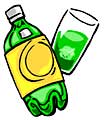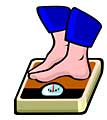|
|
 Diet Sodas; Are We Drinking As Fast as We Can? Diet Sodas; Are We Drinking As Fast as We Can?
by Marjorie Dorfman
Why don’t diet soda cans weigh less than those of other unmentionable colas? Can we, as weight-watching citizens, eliminate even more calories if we drink it through straws? For the answers and even more disturbing questions, read on, if you dare.
|
A man who drinks only water has a secret to hide from his fellow man. – Charles Baudelaire
For the purposes of this study, I must take the less than envious position of being a non-scientific non-authority. What’s that, you say? Well, it means that I am writing about a subject in which I have no background or training and where many of the resources are written in a language that is complex and highly technical. I make no mention of brand names here, for all diet sodas contain the one element of contention: aspartame. I have done my best to present both sides of a very frightening issue: artificial sweeteners and their effect on our health. Any attempts at levity are purely accidental and should be disregarded.
 Whispering to you, dear reader, from the shadows of an addictive personality, I must confess that I have sinned (substituted artificial sweeteners for sugar) both in baking and drinking endeavors. Coupled with the fact that I have diabetes, my dilemma is twofold; to diet soda and risk the evils of aspartame or not to diet soda and opt for sugar, which for me is suicide. (I realize there is also water, but that is not always a very interesting alternative.) Unquestionably, the fact that one can drink as much diet soda as the bladder will allow and not gain an ounce has a great deal going for it. I like my wine, but I sure can’t drink it that way! Caffeine-free diet coke is my preference (or should I say downfall)? Considering my love for coffee (the hi-test variety), I could choose no other; that is unless I don’t care about sleeping at night.
Whispering to you, dear reader, from the shadows of an addictive personality, I must confess that I have sinned (substituted artificial sweeteners for sugar) both in baking and drinking endeavors. Coupled with the fact that I have diabetes, my dilemma is twofold; to diet soda and risk the evils of aspartame or not to diet soda and opt for sugar, which for me is suicide. (I realize there is also water, but that is not always a very interesting alternative.) Unquestionably, the fact that one can drink as much diet soda as the bladder will allow and not gain an ounce has a great deal going for it. I like my wine, but I sure can’t drink it that way! Caffeine-free diet coke is my preference (or should I say downfall)? Considering my love for coffee (the hi-test variety), I could choose no other; that is unless I don’t care about sleeping at night.
 But what do we really know about these diet sodas? Could they be incognito, secret agents without passports invading our lives from another less fattening side? Worse, are they dangerous? The culprit is aspartame and its byproducts, which are considered toxic. These include methanol, formaldehyde (Dr. DeJekyl’s alterego?) and formate. Defenders of the artificial sweetener maintain these byproducts occur in modest amounts in fruits, fruit juices, vegetables, wine and beer. According to Dr. Michael Schacter, MD, "the methanol in juices is chemically bound so it cannot be absorbed into the body, whereas in aspartame it is in a free state, where it can be." But what do we really know about these diet sodas? Could they be incognito, secret agents without passports invading our lives from another less fattening side? Worse, are they dangerous? The culprit is aspartame and its byproducts, which are considered toxic. These include methanol, formaldehyde (Dr. DeJekyl’s alterego?) and formate. Defenders of the artificial sweetener maintain these byproducts occur in modest amounts in fruits, fruit juices, vegetables, wine and beer. According to Dr. Michael Schacter, MD, "the methanol in juices is chemically bound so it cannot be absorbed into the body, whereas in aspartame it is in a free state, where it can be."
For the sake of comparison, a serving of tomato juice the same size as a can of diet soda will produce about five times the methanol in your body as the aspartame in diet cola. Studies have shown how aspartame is converted into alcohol. One indicated that consumption of 2,000 milligrams of aspartame (about 10 cans of diet soda) had no effect on the amount of methanol present in the bloodstream. Another study revealed that ingestion of 600 milligrams per hour for 8 hours (that’s 24 cans of diet soda) did not increase the amount of methanol in the bloodstream to abnormal or harmful levels. Yet another study concluded that subjects were able to consume 10,000 milligrams of aspartame (that’s the equivalent of 50 cans of soda) without ill effects and the level of methanol in the bloodstream returned to normal levels within 8 hours. It must be mentioned, however, that is not known (at least to this writer) who sponsored these studies.
Despite advancements in knowledge and studies, The FDA stands behind its original 1981 approval of the product. The FDA calls aspartame "one of the most thoroughly tested and studied food additives the agency has ever approved." It further claims that "the more than 100 toxicological and clinical studies it has reviewed confirm that aspartame is safe for the general population."
To those of you out there who would not question such a claim from such a formidable authority, allow me to point out that in 2001 David Willman of The LA Times won the Pulitzer Prize in Investigative Reporting for exposing the ineptitude of the Federal Drug Administration. The FDA is constantly pulling products it previously approved and changing the warnings. Even with the best-intentioned watchdogs, too many products get approved. (It would seem that the watchdogs need watchdogs. Ralph Nader, where are you when we need you?)
 And yet in all fairness, it is also true that aspartame has been approved as safe for human consumption by regulatory authorities in over 90 countries, by the Joint Expert Committee on Food Additives of the United Nations Food and Agricultural Organization and by many medical and scientific organizations, including the American Medical Association, the American Academy of Pediatrics, the American Diabetes Association, the Epilepsy Institute and the American Academy of Family Physicians. And yet in all fairness, it is also true that aspartame has been approved as safe for human consumption by regulatory authorities in over 90 countries, by the Joint Expert Committee on Food Additives of the United Nations Food and Agricultural Organization and by many medical and scientific organizations, including the American Medical Association, the American Academy of Pediatrics, the American Diabetes Association, the Epilepsy Institute and the American Academy of Family Physicians.
 Why do many of us have so much trouble believing any, all or even some of them? The answer is because problems have arisen for many imbibers of diet sodas. In 1993 Dr. Ralph Walton, MD of Northeastern Ohio University College of Medicine conducted a study of forty patients which concluded (with much resistance from NutraSweet who tried to block the study) that "individuals with mood disorders are particularly sensitive to aspartame and its use within this population should be discouraged." Why do many of us have so much trouble believing any, all or even some of them? The answer is because problems have arisen for many imbibers of diet sodas. In 1993 Dr. Ralph Walton, MD of Northeastern Ohio University College of Medicine conducted a study of forty patients which concluded (with much resistance from NutraSweet who tried to block the study) that "individuals with mood disorders are particularly sensitive to aspartame and its use within this population should be discouraged."
There have been no serious studies on the subject since then and so we are left in chilly contemplation in front of our open refrigerators for something healthy to quench our thirst. Dr. Walton has also conducted a survey of other aspartame studies in which he concluded: "Of the 166 studies felt to have relevance for questions of human safety, 74 had NutraSweet industry-related funding and 92 were independently funded. One hundred per cent of the industry-funded research attested to aspartame’s safety, whereas 92 per cent of the independently funded research identified a problem."
 What’s a diet conscious soul to do? Is diet soda bad or good? Here are some facts, just the facts, as Jack Webb used to say on Dragnet, and here’s hoping they clear some things up. Aspartame/NutraSweet stimulates the brain so that we think what we are eating or drinking tastes sweet. It is also not coincidental that while using these artificial sweeteners everything else we eat at the same time tastes sweet. There is mounting evidence that the "Burning Mouth Syndrome" experienced by the Desert Storm troops was actually methanol poisoning from the diet soda they drank so much of after being exposed to desert temperatures. What’s a diet conscious soul to do? Is diet soda bad or good? Here are some facts, just the facts, as Jack Webb used to say on Dragnet, and here’s hoping they clear some things up. Aspartame/NutraSweet stimulates the brain so that we think what we are eating or drinking tastes sweet. It is also not coincidental that while using these artificial sweeteners everything else we eat at the same time tastes sweet. There is mounting evidence that the "Burning Mouth Syndrome" experienced by the Desert Storm troops was actually methanol poisoning from the diet soda they drank so much of after being exposed to desert temperatures.
In its favor, aspartame can reduce or replace the sugar and calories in foods and beverages while maintaining great taste. Thus it offers one simple step in helping people move closer to achieving a more healthful diet. With nearly two out of every three Americans classified as overweight or obese, taking steps to assure appropriate caloric intake is very important to many people. Consumers can easily enjoy products sweetened with aspartame as part of a healthful diet.
It is also true that aspartame/ NutraSweet’s 10% methanol appears in the body quickly and is the same "wood alcohol" your mother warned could make you blind. The 40% Aspartic Acid in the sweetener is an "excitotoxin" in the brain, where it kills cells and causes other nerve damage. It has also been known, when it is not too busy doing all these other things, to be a major trigger for migraine headaches. What on earth are we all to do? My diabetes limits my choices more than the average person. Even with yogurt for example, I can’t eat most of the low fat brands because they are very high in sugar. (Check out some of those labels the next time you’re in the supermarket. You’ll be amazed how much sugar is in one container of yogurt.) My diabetes educators recommend only one brand; Light and Fit by Dannon. Can you take a wild guess as to which artificial sweetener it contains?
 Aspartame allows me to enjoy foods that I would not otherwise be able to have. I will continue to use it because there is nothing else to choose from. (Even my coffee I sweeten with Splenda. I had tried Equal but they are both the same in the aspartame department, making the equation of six of one and half dozen of another.) And even if some scientists (mad or otherwise) come up with another sweetener, who’s to say that down the road that won’t be considered as controversial as aspartame is today? So the bottom line, dear reader, is this. Surf the wild waves, leap the tall buildings, ride the bucking bronco and use aspartame AT YOUR OWN RISK! Eat, drink and do your best to be jolly, for it very well may be true that tomorrow we will die. Benjamin Franklin said there was no avoiding death and taxes. Maybe he was right, but at least with the help of aspartame we can all die a little thinner. Unfortunately, according to most experts, that doesn’t make us any less dead! Aspartame allows me to enjoy foods that I would not otherwise be able to have. I will continue to use it because there is nothing else to choose from. (Even my coffee I sweeten with Splenda. I had tried Equal but they are both the same in the aspartame department, making the equation of six of one and half dozen of another.) And even if some scientists (mad or otherwise) come up with another sweetener, who’s to say that down the road that won’t be considered as controversial as aspartame is today? So the bottom line, dear reader, is this. Surf the wild waves, leap the tall buildings, ride the bucking bronco and use aspartame AT YOUR OWN RISK! Eat, drink and do your best to be jolly, for it very well may be true that tomorrow we will die. Benjamin Franklin said there was no avoiding death and taxes. Maybe he was right, but at least with the help of aspartame we can all die a little thinner. Unfortunately, according to most experts, that doesn’t make us any less dead!
Did you know . . .?
|
|
|
|
 |
|
|
 "I didn’t fight my way to the top of the food chain to be a vegetarian." "I didn’t fight my way to the top of the food chain to be a vegetarian."
Bumper sticker
"Why does man kill? He kills for food. And not only food; frequently there must be a beverage."
Woody Allen, Without Feathers
|
Don't miss this excellent book:
Eat, Drink, and Be Healthy
The Harvard Medical School Guide to Healthy Eating
by Walter Willett, MD
 
A nutrition expert from the esteemed Harvard Medical School presents a detailed regimen for healthy eating that readers can adopt for a lifetime, not just until the next big thing comes along. Dispelling many of the popular theories about nutrition that lead to foolish extremes, the book promotes a more balanced approach to eating and addresses the shortcomings of the misleading USDA food pyramid.
|

Click for a printer friendly version of this article.
|
|